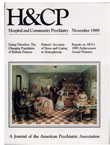Behavior Therapy: A Clinical Update
Abstract
Through refinements from research and judicious combination with other therapies, behavior therapy has become increasingly relevant in the treatment of psychiatric disorders. After outlining the four models that serve as a framework for behavior therapy (classical conditioning, operant conditioning, social learning theory, and cognitive behavior modification), the authors provide an update for clinicians on developments in the behavioral treatment of anxiety disorders, sexual disorders, depression, and schizophrenia. Most advances have been made in the treatment of anxiety disorders, including definition of variables for successful use of exposure to phobic stimuli in the treatment of phobic disorders and the use of flooding for post-traumatic stress disorder. By becoming better acquainted with cognitive and behavioral therapies, clinicians may be able to offer their patients more effective treatment options.
Access content
To read the fulltext, please use one of the options below to sign in or purchase access.- Personal login
- Institutional Login
- Sign in via OpenAthens
- Register for access
-
Please login/register if you wish to pair your device and check access availability.
Not a subscriber?
PsychiatryOnline subscription options offer access to the DSM-5 library, books, journals, CME, and patient resources. This all-in-one virtual library provides psychiatrists and mental health professionals with key resources for diagnosis, treatment, research, and professional development.
Need more help? PsychiatryOnline Customer Service may be reached by emailing [email protected] or by calling 800-368-5777 (in the U.S.) or 703-907-7322 (outside the U.S.).



